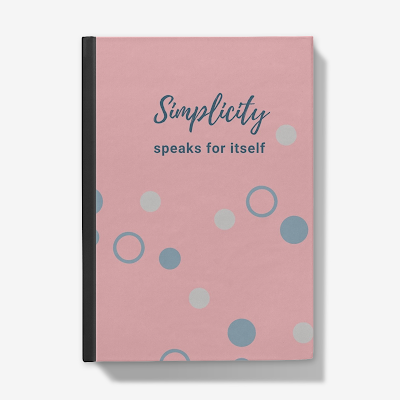Journaling is a deeply personal and introspective practice that allows one to reflect, express emotions, and document their experiences.It provides a safe space to unravel thoughts, seek clarity, and nurture self-awareness. While many guides and articles focus on the "do's" of journaling, it's equally important to understand the "don'ts" to ensure an authentic and fulfilling journaling journey.
In this blog post, we'll explore three essential "don'ts" of journaling and emphasize the significance of embracing your own style and freedom within this practice.
Don't run for a fancy/cute journal if that doesn't entice your soul
In the age of social media, it's easy to get caught up in the aesthetically pleasing side of journaling.
Pictures of beautiful journals adorned with cute designs and fancy accessories can be enticing. However, it's crucial to remember that the purpose of journaling is not about the external appearance, but rather the inner connection and self-expression it fosters.
Choosing a journal that resonates with you, regardless of its outward appearance, is essential. It's about finding a medium that invites you to open up and engage with your thoughts, rather than being too conscious of what a journal should look like.
Don't journal every day or on a tight schedule
While consistency in journaling can be beneficial for some, it's important to recognize that everyone's journaling journey is unique.
There may be days or weeks when life gets busy or overwhelming, making it challenging to dedicate time to journaling.
Instead of pressuring yourself to journal every day or follow a rigid schedule, allow yourself the flexibility to journal when it feels right for you.
This approach ensures that journaling remains a mindful and enjoyable experience rather than turning into a burden or another item on your already overwhelming to-do list. Journaling should be a source of solace and self-care, not an obligation.
Don't copy someone else's style if that doesn't suit you
In the digital age, we are exposed to various styles of journaling through social media platforms, blogs, and YouTube channels. While it can be inspiring to see others' creative approaches, it's crucial to remember that journaling is deeply personal.
Each individual has their own unique voice and preferred methods of self-expression. Embrace your individuality and explore what works best for you. Experiment with different writing styles, and artistic techniques, or even incorporate photos, sketches, or collages if it resonates with your personality and creative preferences.
Authenticity in journaling is the key, and copying someone else's style may hinder your ability to connect with your true thoughts and emotions.
Why didn't I mention the "Do's" of journaling?
The reason why the "do's" of journaling were not mentioned in this blog post is that journaling is an inherently personal practice. It serves as a blank canvas for self-discovery and self-expression. By omitting a list of specific "do's," the intention is to emphasize the freedom and autonomy that journaling provides.
There are no rules or one-size-fits-all approaches to journaling. What matters most is finding your own path and allowing your journal to become a reflection of your unique journey.
In the world of journaling, it's important to remember that the "don'ts" can be just as vital as the "do's." By avoiding the pressure to conform, embracing our own personal style, and allowing ourselves the freedom to journal when it feels right, we create an authentic space for self-reflection and growth.
Journaling is a journey of self-discovery, and by honoring our individuality, we can deepen our connection with ourselves. Remember, journaling is a deeply personal and introspective practice, and it's crucial to prioritize our own needs and preferences when engaging in this life-altering activity.
By not running for a fancy or cute journal that doesn't call us to journal, we shift the focus from external appearances to internal experiences. It's about finding a journal that feels comfortable, inviting, and aligned with our own tastes and preferences.
Whether it's a simple notebook or a plain journal, what matters most is the connection we establish with our journaling process and the content we create within its pages.
Similarly, by not journaling every day or on a rigid schedule, we allow ourselves the freedom to be in tune with our own rhythms and emotions. While some individuals may find solace in a daily journaling routine, others might feel overwhelmed or constrained by the pressure to write consistently.
Granting ourselves the flexibility to journal when it feels natural and meaningful allows for a more organic and authentic experience. It ensures that each journaling session is an intentional act of self-care rather than a mundane task to check off our to-do list.
Lastly, by not copying someone else's style, we honor our individuality and creative expression. While it's natural to be inspired by others and their journaling techniques, it's important to remember that our journal is our personal space. It should reflect our unique voice, thoughts, and emotions. Experimenting with different styles, incorporating our own artistic flair, or even deviating from traditional writing formats can help us connect more deeply with ourselves. Journaling becomes a journey of self-discovery, self-expression, and self-acceptance.
Hence, understanding the "don'ts" of journaling is just as essential as embracing the "do's." Journaling is a personal space that allows us to explore our innermost thoughts, emotions, and experiences. It's a tool for self-reflection, growth, and self-care. So, embrace your own style, honor your preferences, and let your journal become a true reflection of your authentic self. Happy journaling!
_____________________
Don't forget to check out MEETLIFE JOURNALS and grab one for yourself or your loved ones.
Keywords:
- Journaling mistakes
- Common journaling mistakes
- How to avoid journaling mistakes
- Bad journaling habits
- How to break bad journaling habits
- Tips for journaling beginners
- How to journal effectively
- Common journaling pitfalls
- How to avoid journaling pitfalls


All are Valid points
ReplyDelete